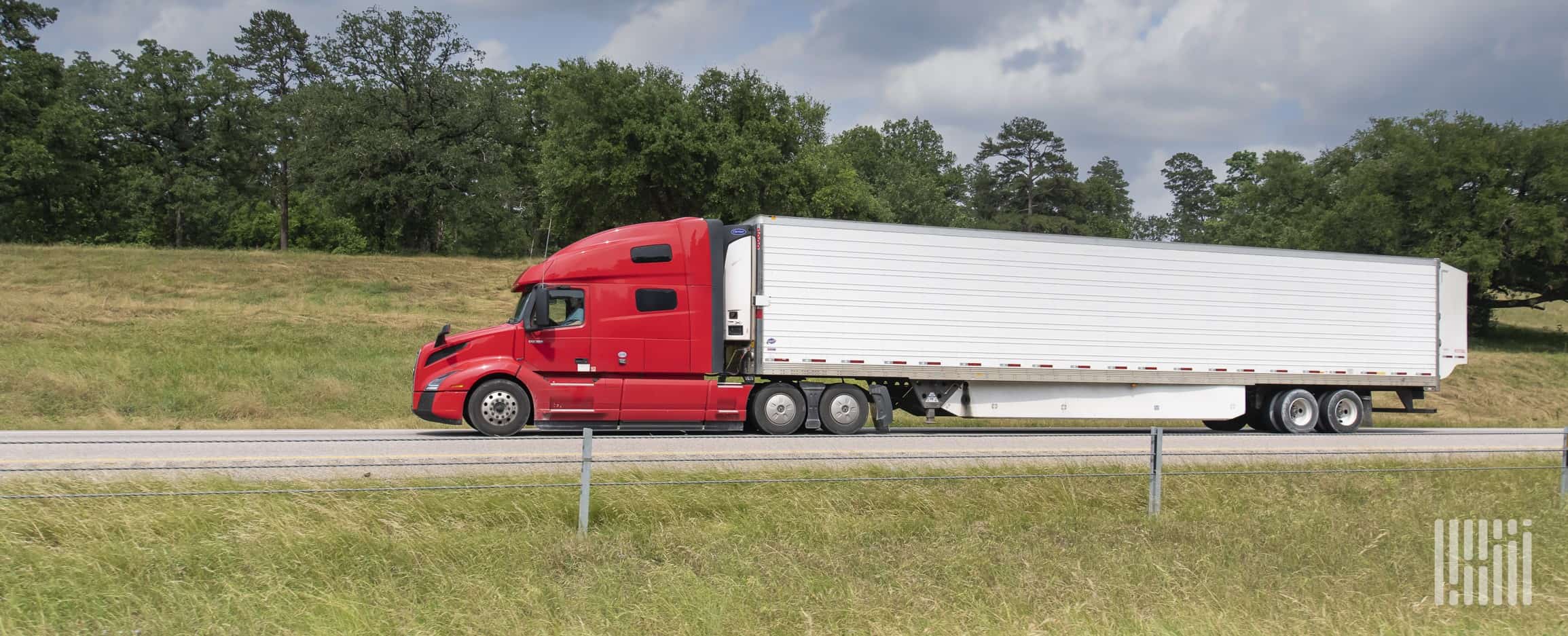Navigating the world of trucking comes with its unique set of challenges and rewards, and choosing to drive a reefer trailer amplifies both. Reefer trailers, essential for transporting temperature-sensitive goods, offer distinct advantages in terms of pay and job stability.
However, they also present unique challenges requiring specialized skills and unwavering attention. Dive in as we break down the pros and cons of steering your career in this specialized direction.
And when you’re finished reading, explore more content in our ‘Reefer truck’ article series:
- What is a reefer truck?
- How much do reefer loads pay?
- Pros and cons of driving a reefer trailer
- Reefer trailer for sale vs lease
How reefer trailers work
Reefer trailers work by maintaining a consistent internal temperature to safely transport temperature-sensitive goods. Here’s a breakdown of how they function:
- Reefer unit: At the front of the reefer trailer is a reefer unit, a refrigeration unit specifically designed for these trailers. This unit functions similarly to a home refrigerator but on a larger scale.
- Temperature control: The reefer unit uses a compressor, condenser, and evaporator to circulate refrigerant, removing heat from the trailer’s interior and releasing it outside. This ensures temperature control within the specified range — cooling or heating — depending on the cargo’s needs.
- Insulation: The walls, floor, and roof of refrigerated trailers are heavily insulated to reduce heat exchange between the inside and outside. This insulation helps maintain the desired internal temperature with minimal energy consumption.
- Air circulation: Proper air circulation is crucial in reefer trucking. The reefer unit typically comes with fans that circulate air throughout the trailer. This ensures even temperature distribution, and prevents hot or cold spots.
- Temperature monitoring: Modern reefer trailers often have monitoring systems that provide real-time data on the trailer’s temperature. This helps drivers and logistics teams ensure that the goods remain within the desired temperature range.
- Power source: While on the road, the reefer unit typically runs on diesel reefer fuel. However, when parked, it can also operate on electric power to save on fuel and reduce emissions.
- Defrost cycle: To prevent ice buildup inside the unit, especially during very cold conditions, the reefer unit periodically goes into a defrost cycle. This ensures consistent cooling performance.
By combining these features, reefer trailers provide reliable temperature control storage solutions for transporting perishable and temperature-sensitive items. This ensures the cargo’s safety and integrity throughout the journey.
Pros of driving a reefer trailer
Driving a truck is a career path that many embark upon, but specializing in reefer transportation can offer distinct advantages. Here’s a closer look at the benefits of steering your career toward driving a reefer box truck.
Higher pay rates
One of the standout benefits of working as a reefer truck driver is the potential for higher earnings. Given the reefer load’s sensitive nature, drivers are tasked with ensuring reefer shipping is carried out flawlessly.
This added responsibility, coupled with the necessity to understand the intricacies of reefer units and maintaining the right refrigerated truck temperature range, often translates to higher pay rates compared to regular trucking jobs.
Stable demand
The need for perishable goods transportation ensures that there’s always a demand for reefer trucking. No matter the season or economic climate, people still need to eat, hospitals still require storage with temperature control during transport, and countless industries depend on timely reefer shipments. Whether it’s transporting fresh produce, pharmaceuticals, or frozen goods, the steady demand means consistent work and income for reefer truck drivers.
Diverse job opportunities
Being a driver in the reefer sector is not just about transporting frozen goods. The industry offers a myriad of reefer freights, opening doors to various sectors and routes. There’s the opportunity to delve into specialized areas like hauling reefer loads for gourmet restaurants, for instance. Others deliver sensitive scientific equipment that requires precise reefer trailer dimensions and temperature settings.
Moreover, the routes are diverse, ranging from local deliveries to long-haul cross-country trips. This flexibility allows drivers to choose assignments that align with their lifestyle, be it staying close to home or exploring the nation.
In conclusion, while there are challenges to contend with, like carrying out reefer unit troubleshooting, driving a reefer trailer is worth consideration. Whether you’re a seasoned truck driver considering a switch or an industry newcomer, reefer trucking beckons with promising prospects.
Cons of driving a reefer trailer
While driving a reefer truck can offer numerous advantages, it also comes with its share of challenges. From handling temperature-sensitive goods to unpredictable schedules, here’s a closer look at the potential downsides of embarking on a career in reefer trucking.
Increased responsibility
A significant concern for those in the reefer transportation world is the added onus of safeguarding perishable goods. Unlike regular trucking, where cargo is usually static, reefer cargoes are dynamic. Drivers have to constantly monitor and manage the truck’s temperature, ensuring it stays within the optimal refrigerated truck temperature range.
Additionally, there’s the looming risk of reefer unit problems, which could compromise the entire load. These responsibilities mean that truckers need to be constantly vigilant, aware of their reefer bulkhead, and prepared to act swiftly in emergencies.
Irregular schedules
Life on the road for reefer drivers can be unpredictable. The demand for fresh produce and other perishable goods doesn’t always align with a 9-to-5 schedule. Often, drivers find themselves on the road during weekends, holidays, or late into the night, ensuring the reefer shipment reaches its destination while goods are still fresh.
This irregularity can be tough on one’s social life and family, and potentially challenging for those who thrive on routine.
Stressful work environment
The nature of reefer shipping can create a high-pressure work environment. A refrigerator failure or delay due to unforeseen issues can lead to substantial financial losses. Dealing with potential reefer engine breakdowns can be overwhelming, especially when time is of the essence.
Besides mechanical challenges, drivers must also grapple with factors beyond their control, like inclement weather, which can impact the cargo’s condition or cause unexpected delays.
So, while the world of reefer in trucking offers lucrative opportunities, it also demands resilience, adaptability, and unwavering commitment. As with any career choice, potential reefer truckers should weigh these challenges against the rewards to determine whether to proceed down this path.
Key considerations before driving a reefer box truck
Choosing a career path driving refrigeration trailers can be fulfilling, but it’s not for everyone. There are certain facets of the job and personal aspects to consider before diving in. Here’s a closer look at some of the key considerations to ponder.
Personal lifestyle
Being a reefer driver requires adaptability, especially when it comes to personal lifestyle. Unlike many other professions, trucking, especially in the reefer sector, can have unpredictable hours.
This irregularity might interfere with personal commitments, family time, and even simple joys like celebrating holidays or attending special events. It’s vital to reflect on whether you’re ready to make such sacrifices.
Coping with challenges on the road
Reefer trucking is not without its challenges. From ensuring that the refrigerated semi truck is operating optimally to facing unexpected roadblocks, the life of a reefer driver can be full of surprises.
Being able to cope with challenges, manage stress, and stay calm under pressure is essential. Can you handle the pressure of ensuring the trailer maintains its temperature? Or deal with the frustration of technical hitches? These are real scenarios in the life of a reefer truck driver, and having a robust coping mechanism is crucial.
Job commitment and dedication
The job commitment required in reefer trucking is immense. The cargo you’re transporting is often perishable, which means there’s little room for error. A delay or a breakdown isn’t just an inconvenience; it can result in substantial financial losses. Hence, the job requires unwavering commitment, dedication, and a sense of responsibility.
You’ll need to familiarize yourself with different trailer refrigeration units, understanding the specifics of each, like the nuances of bulkhead trailer reefer and the intricacies of cool time trailers. The commitment also extends to being updated with the latest in reefer trucking, ensuring cargo safety, and delivering on time.
Is reefer trucking right for you?
Driving a reefers offers many opportunities, but it also demands a lot from an individual. Balancing personal lifestyle, coping effectively with challenges, and dedicating oneself entirely to the job are foundational pillars for anyone considering this profession.
If you believe you have the mettle, passion, and commitment, the world of reefer trucking awaits with open arms. But it’s essential to embark on this journey with a clear understanding of its demands.
FAQ
Driving a reefer requires added attention due to the need to maintain specific temperatures for perishable goods, making it more challenging than standard trucking.
Reefer trucking can be worth it, offering higher pay rates and consistent demand due to the transportation of perishable items.
A reefer trailer is a refrigerated trailer used in trucking to transport temperature-sensitive goods, ensuring they remain at specific temperatures during transit. These trailers are essential for items like perishable foods, certain pharmaceuticals, and other products that require controlled environments.



